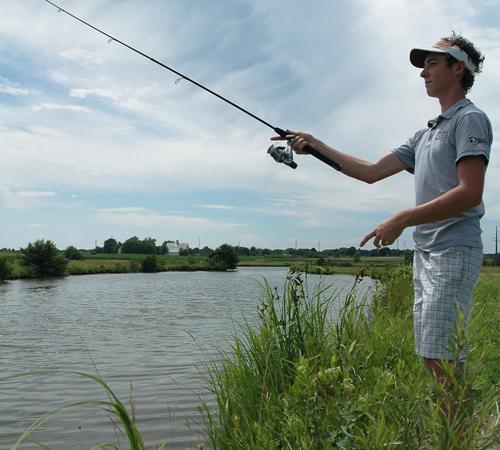Students feeling the heat

Tom Gardner, 19, of Urbana, fishes at a pond on the corner of First and Windsor on June 22, 2007. Steve Contorno
Jun 27, 2007
Last updated on May 12, 2016 at 01:02 p.m.
The sun beats down on a hot summer day in Champaign, but is that something to be worried about? The issue of global warming continues to rise in the public’s awareness, spurred most noticeably by the 2006 release of Al Gore’s “An Inconvenient Truth.”
However, the effects of this threat cannot be seen immediately or all at once – so the questions remain: How imminent a threat is global warming? What needs to be done about it? Is global warming a threat at all?
“We’re definitely experiencing global warming; global temperatures are increasing,” said Tom Abram, who ran for Illinois state representative in the 103rd district with the Green Party last November. “There’s a range of possibilities in what types of effects will be realized. On the far end, the effects could be disastrous.”
Abram said global warming was one of his principal issues during his candidacy.
Get The Daily Illini in your inbox!
According to the Web site of Enviromental Defense, an organization dedicated to using science to protect the environment, 2006 was the hottest year on record in the contiguous United States, and America is the top global warming polluter in the world.
Ed Kieser, WILL chief meteorologist, said that although he is not an expert on global warming, he does believe we are experiencing it.
“It’s clear that there is an increase in the global average temperatures taking place, and there is more evidence suggesting that at least some of it is due to human influence,” Kieser said.
He added that there is a lot of argument about how much global warming can be attributed to human influence and how much is cyclical.
“Even if it is natural, you still have to deal with that,” he said.
There is also debate about what should be done to solve the problem.
“The solution needs to happen, um, four years ago, but unfortunately we won’t see the problems that will motivate us to actually act for decades,” said Ben Barnes, graduate student in Engineering and member of Engineers Without Borders. “We’re seeing them now, but they don’t hit enough people with enough power to really lead to action.”
Barnes said Engineers Without Borders was started because of inconsistent access to resources across the globe.
“The worst of global warming is going to hit those least able to deal with it,” he said.
According to the National Oceanic and Atmospheric Administration, this past spring was the driest one on record in the United States, as well as the fifth warmest.
Barnes said there is more the University could be doing to be part of the solution.
“We’re basically a really densely populated community right here that consumes a lot of food and energy,” Barnes said. “We have an opportunity to become a living laboratory and an example and really show students what it’s like to live in a sustainable community.”
He said the University should consider the uses these skills will provide in the job market.
“Businesses nowadays are looking for people who can face these challenges because they know they’re coming,” Barnes said. “They’re starting to realize the cost of not solving these problems. So they want engineers and planners and architects who are prepared to produce sustainable designs and consider the carbon footprint of everything they do.”
Since 1990, the burning of fossil fuels has caused the nation’s carbon dioxide emissions to increase by 20 percent, according to environmentaldefense.org. Emissions are estimated to increase by another 15 percent by 2020 if nothing is done to stop the pollution.
Abram said individual efforts are significant.
“There’s a lot that can be done,” he said. “Getting efficient lighting in homes or dorms. Turn off appliances when they’re not being used. A lot of students drive to class or drive around town. We have a pretty good transportation system and students pay for it.”
In the 2006 elections, Rich Whitney, the Green Party candidate for Illinois governor, earned enough of the vote to make the Green Party an established political party in Illinois, lowering future signature requirements and allowing primary elections to be held. These measures will make it easier for Green Party candidates to get on the ballot in 2008, and may change campaign strategies for multiple political parties.
“I think what we’re going to start to see is first of all the Greens are going to run more candidates discussing global warming,” Abram said. “I think the Democrats will also run more candidates discussing global warming to prevent people from voting Green. I think we’re going to see more discussion all around.”
Abram said he enjoyed his 2006 run and plans to continue participating politically and eventually run again, although he does not know when.





